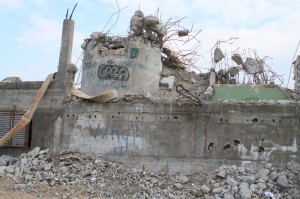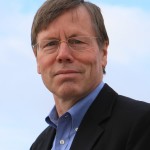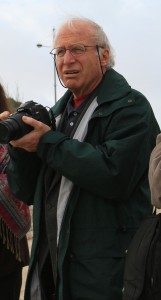Doctors find Gaza still lacking food, clean water, electricity
(This is Part 3 in a series. For the next several days, Gerri Haynes, a former president of Washington Physicians for Social Responsibility, will be sending back reports from inside blockaded Gaza. As she did twice before, Gerri has organized a team of doctors and other health care providers to work in hospitals and clinics in Gaza in an effort to directly help the people there and to bring attention to the ongoing humanitarian crisis that the Israeli blockade has created.)
As we dispersed this morning to our various assignments, we were aware of the huge challenges faced by the people of Gaza: inadequate nutritional food, lack of access to clean air and water, regular cuts in electrical power, the constant threat of military attack, ongoing political turmoil, no freedom of movement beyond the borders – and still, the graciousness of the people who greet us wherever we go.
It is night and three of our surgeons – Laura Hart, Rich Grady and Ismael Zamilpa, along with Johanna Longacre, operating room nurse, are still working.Steve Gilbert, Toxicologist, wrote this about his experience today:
“To discuss the considerable environmental and public issues of Gaza I met with Chairman, Yousif K. Ibrahim and his staff of the Palestinian National Authority Environmental Quality Authority (EQA). He first described the many challenges facing the Palestinian people, including air pollution, water quality, chemical exposures, and energy generation. All of these issues are connected, interact, and overlap to create serious environmental and human health issues. Without adequate power, people run portable generators, which pollute the air. Wastewater
Many physicians have left Gaza in recent years – the challenges of life and medical practice here have encouraged them to seek alternative practice situations. But Gaza does have a new child psychiatrist – recently returned from four years of training in Israel. He reported expressing just yesterday the need for the sand therapy toys we were able to bring to him today and he spoke of great surprise and joy in receiving these tools.
The toys will be used in assisting the children of Gaza to work with their feelings about the constricted life they are experiencing in this externally occupied land.
At Shifa Hospital today, Don Mellman, neurological surgeon from Tampa, Florida assisted in a successful spinal surgery procedure, then participated in discussions of cases involving children and adults. A group of Gaza neurosurgeons also participated in a discussion about their frustrations with the difficulty of continuing their professional education because of severe restrictions on travel outside Gaza.Bob Haynes, cardiologist, was able to see patients in two hospitals today. As he moved between hospitals, he was able to observe again, the setting up of the vital – yet polluting – system of individual generators in front of every store. Electricity goes off, the generators go on and the air fills with loud noise and noxious fumes.
This evening, we met with Wasseem Al Sarraj, whose father is the founder of our host organization. Wasseem is working on two research projects with TIDA: reading habits in Gaza and the role of Hamas in government here. You may read of Tida’s work at www.tidagaza.org.
My morning today was spent with a brilliant young woman who was a long-time employee of the Gaza Community Mental Health Programme. Last year, she accepted the directorship of the Palestinian Working Woman Society for Development. Much of their work is focused on psychosocial support for women and children who have suffered the effects of war – particularly in the marginalized areas near the border with Israel. Also, they are running a resource center for women who need legal support in questions of divorce, child custody and equal rights. Women in this society are finding ways to support their homes and their culture in the midst of the exquisite and unrelenting challenges of the ongoing siege.
“Inspiring” is an insufficient word for the work being done here in the midst of heartbreak.
RSS feed for comments on this post. TrackBack URI


